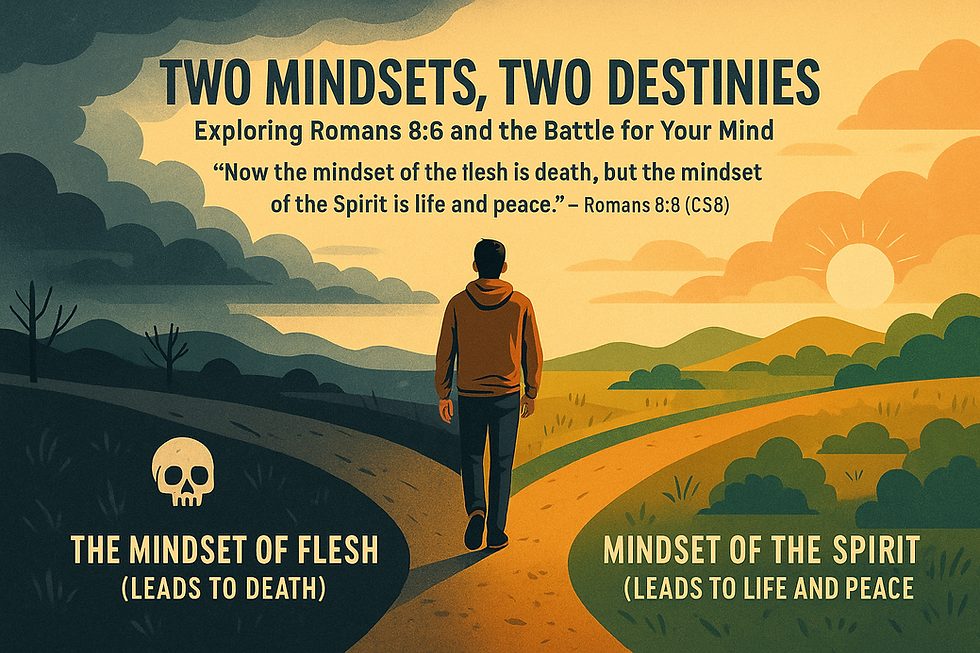Part 1: Two Mindsets, Two Destinies
- dktippit3
- Jul 14, 2025
- 3 min read

A Series on “Mindset of the Spirit: A Life of Peace”
Exploring Romans 8:6 and the Battle for Your Mind
“Now the mindset of the flesh is death, but the mindset of the Spirit is life and peace.” — Romans 8:6 (CSB)
Whether we realize it or not, every one of us lives with a dominant mindset—a mental framework that shapes our desires, decisions, and direction. In Romans 8:6, Paul draws a clear line between two radically different mindsets: one leads to death, the other to life and peace.
And he’s not just being poetic.
He’s telling us that what we think about, focus on, and dwell in has real consequences—eternal ones. This is the battleground of discipleship: the war for your mind. In this series, we’ll unpack what it means to live with either the mindset of the flesh or the mindset of the Spirit, and how those choices shape our daily lives.
Let’s begin with a breakdown of both.
The Mindset of the Flesh (Leads to Death)
This doesn’t mean immediate physical death. Paul is describing something far deeper: spiritual ruin, emotional exhaustion, relational breakdown, and separation from God’s best for you. The mindset of the flesh is what happens when we let our desires, impulses, and worldly influences become the standard we live by.
Here are some real-world expressions of this mindset today:
Materialism Mindset
Always chasing more—more stuff, more money, more status. You’re never content, always anxious. You live to get, but it’s never enough.
Self-Gratification Mindset
“If it feels good, do it.” Whether it’s porn, overeating, drugs, or endless scrolling—you follow every impulse. The soul gets numbed. Joy slowly fades.
Comparison Mindset
Living on Instagram, comparing your body, your job, your spouse, your life. Jealousy grows. Resentment festers. You stop enjoying your own blessings.
Autonomy Mindset
“No one tells me what to do—not God, not Scripture.” You worship your freedom, but it leads to isolation, confusion, and inner chaos.
Victim Mindset
You define your life by what others did to you. Blame replaces growth. You stay stuck, bitter, and spiritually stagnant.
All of these mindsets promise something—control, comfort, power, attention—but in the end, they lead to death. Not always suddenly, but surely.
The Mindset of the Spirit (Leads to Life and Peace)
In contrast, Paul describes a radically different way of living: a Spirit-led, Jesus-focused mindset that results in wholeness, clarity, and true freedom. It’s not about faking peace—it’s about being filled by it. This is the fruit of walking in step with the Spirit (Gal. 5:25).
Here’s what that looks like today:
Kingdom Mindset
Your eyes are on eternity. You work hard, but your identity isn’t in success. You give generously, love sacrificially, and live on mission.
Surrendered Mindset
You let God interrupt your plans. You pause before reacting. You ask the Spirit to lead—not your fears, not your frustration.
Gratitude Mindset
Instead of scrolling and comparing, you notice small blessings. Peace grows when thankfulness becomes your default posture.
Renewed Mindset
You meditate on Scripture. You fill your mind with truth. You’re aware of your thoughts and take them captive, just like 2 Corinthians 10:5 calls us to.
Servant Mindset
You build others up. You forgive quickly, encourage freely, and take joy in others’ success. Pride dies, and life blooms in your relationships.
These aren’t just "positive vibes." They are the fruit of a life saturated in the presence and truth of God’s Spirit.
Bottom Line
What you set your mind on sets the direction of your life.
We live in a world of endless noise—ads, social media, distractions, desires. The default is drift. But the call of Christ is intentionality. We don’t naturally stumble into a Spirit-led mindset—we choose it. We cultivate it. We pray for it. We return to it when we’ve wandered.
And when we do, we find what everyone else is still searching for:
Life. And peace.
🔜 Coming Next in the Series:
Eyes on Eternity: Living with a Kingdom Mindset
Discover how an eternal perspective transforms your priorities, fuels your generosity, and grounds your identity in something greater than success.
.png)



Comments